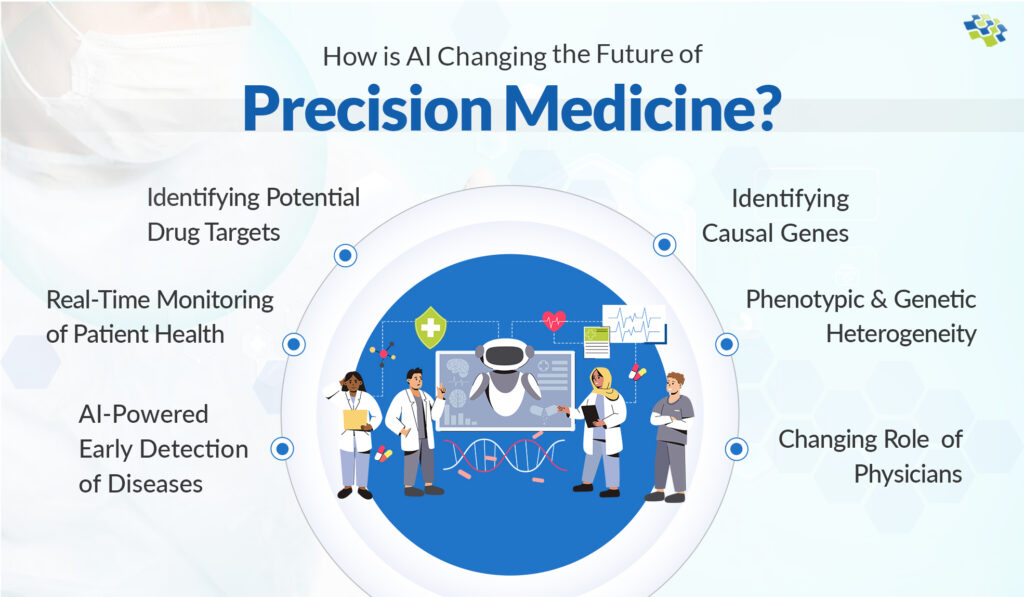What is Precision Medicine doing for
Cancer Treatment with AI
In the rapidly evolving fields of healthcare and technology, precision medicine and artificial intelligence (AI) are emerging as powerful allies in the fight against cancer. By tailoring treatments to the individual characteristics of each patient, these innovations are transforming cancer care with personalized and highly effective strategies. Dino Prado, NMD from Envita, explains how the fusion of precision medicine and AI is not only revolutionizing cancer treatment but also setting the stage for groundbreaking advances in early detection, targeted therapy, and preventive care.
Understanding Precision Medicine in Oncology
Precision medicine redefines traditional approaches to healthcare by focusing on the unique genetic makeup, lifestyle, and environmental factors that influence a person’s health. In oncology, its promise lies in its ability to address cancer’s complexity by:
- Identifying molecular and genetic biomarkers that define the tumor
- Tailoring treatment strategies based on individual patient profiles
- Reducing unnecessary side effects and avoiding ineffective treatments
This individualized method replaces one-size-fits-all treatments with focused interventions that significantly increase the chances of successful outcomes. Patients receive therapies that are specifically chosen to combat the unique characteristics of their cancer, paving the way for more effective and less invasive treatments.
The Role of AI in Enhancing Cancer Treatment
 AI plays a pivotal role in harnessing the power of precision medicine by processing and analyzing vast amounts of medical data. Through advanced machine learning algorithms and deep learning techniques, AI systems can identify patterns and correlations that might be missed by human analysis. Key contributions of AI in oncology include:
AI plays a pivotal role in harnessing the power of precision medicine by processing and analyzing vast amounts of medical data. Through advanced machine learning algorithms and deep learning techniques, AI systems can identify patterns and correlations that might be missed by human analysis. Key contributions of AI in oncology include:
- Data Aggregation and Analysis: Rapidly synthesizing complex genomic data, imaging scans, and clinical reports to inform treatment decisions
- Predictive Modeling: Forecasting tumor growth and recurrence potential based on historical and real-time data
- Personalized Treatment Recommendations: Matching patients with therapies that best address their specific cancer profile
- Accelerated Drug Discovery: Analyzing molecular interactions efficiently, thereby identifying promising therapeutic compounds
By integrating AI, precision medicine evolves into a dynamic system that continuously learns and adapts, offering the potential for earlier diagnoses, more accurate risk assessments, and improved patient outcomes.
Innovative AI Technologies in Cancer Care
Recent advancements demonstrate how AI-driven tools are reshaping the landscape of cancer treatment. These innovations include:
- Machine Learning Algorithms: These algorithms process terabytes of data, extracting essential insights from genetic sequences, clinical histories, and imaging studies. This leads to better prediction of treatment responses and improved survival rates.
- Deep Learning and Neural Networks: Mimicking the human brain’s interactions, these systems interpret complex medical images, accurately distinguishing between benign and malignant tissues.
- Natural Language Processing (NLP): By analyzing unstructured data in medical records and research articles, NLP technologies help clinicians stay informed about the latest evidence-based practices and emerging treatment protocols
The integration of these technologies enhances the precision of cancer therapies, ensuring that therapeutic strategies are as individualized as the patients who need them.
Real-World Applications and Success Stories
The practical impact of AI and precision medicine is evident in various successful case studies in oncology. Hospitals and research institutions across the globe have embraced these technologies, leading to noteworthy outcomes such as:
- Early Detection: AI-powered imaging systems have identified tumors at stages far earlier than conventional methods, offering a critical window for effective treatment.
- Reduced Analysis Time: In clinical settings, AI has drastically cut down the time required to analyze complex genomic data, ensuring that patients receive prompt and tailored interventions.
- Tailored Treatment Plans: Combining individual genetic profiles with AI insights, clinicians have devised treatment strategies that minimize side effects while maximizing therapeutic effectiveness.
These examples underscore the tangible benefits of incorporating AI into precision medicine, providing hope to countless patients and representing a substantial leap forward in cancer care.
Benefits of AI-Powered Precision Medicine in Cancer Treatment
The application of AI in precision medicine offers numerous compelling benefits that are transforming the field of oncology:
- Enhanced Diagnostic Accuracy: AI systems are adept at discerning subtle patterns in medical imaging and tissue analysis that may indicate the earliest signs of cancer.
- Quicker Treatment Decisions: With rapid processing of large datasets, AI helps clinicians arrive at informed decisions faster, crucial for time-sensitive cancer treatments.
- Customized Therapies: By aligning treatment with an individual’s molecular profile, patients experience fewer adverse reactions compared to standard treatments.
- Preventive Interventions: Predictive models powered by AI can assess cancer risk, allowing for early lifestyle modifications or preventive therapies that may forestall the development of the disease
This synergy between technology and personalized care ultimately leads to better patient outcomes, making cancer treatment more efficient and reducing the overall burden of the disease on individuals and society.
 Envita’s Leading Role in AI-Driven Precision Medicine
Envita’s Leading Role in AI-Driven Precision Medicine
At Envita, the future of cancer treatment is being redefined every day under the expert guidance of Dino Prado, NMD. Their approach seamlessly integrates precision medicine with AI technologies to build highly personalized treatment protocols that address each patient’s unique profile.
Envita’s dedicated team leverages state-of-the-art research and clinical expertise to:
- Develop tailored treatment strategies based on comprehensive genomic analyses
- Utilize AI-powered tools to predict patient outcomes and optimize therapeutic approaches
- Continuously improve and refine our protocols through real-world feedback and innovative research
Their commitment to enhancing patient care through these advanced methodologies sets us apart. They believe that every patient deserves a treatment plan that is as unique as their genetic signature and life story. With Envita, you are part of a future where technology meets compassionate care.
Listen on Podcast
Did you like your experience?
Please leave us a Testimonial HERE if you have a Google account.
Your word helps get our word out to more people.
Thank you in advance!!



